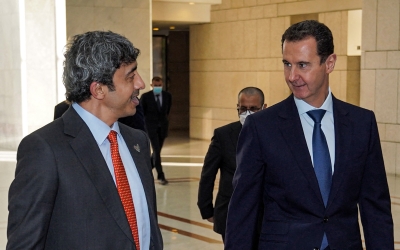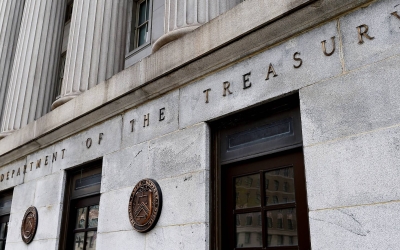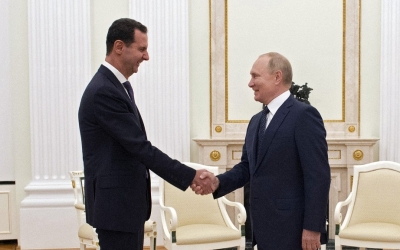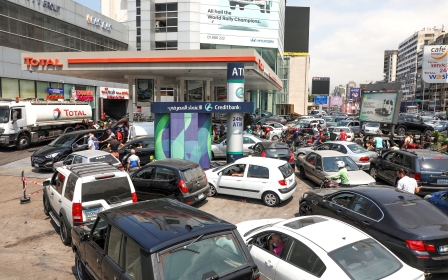Syria to host 2024 energy conference as Arab normalisation gains momentum
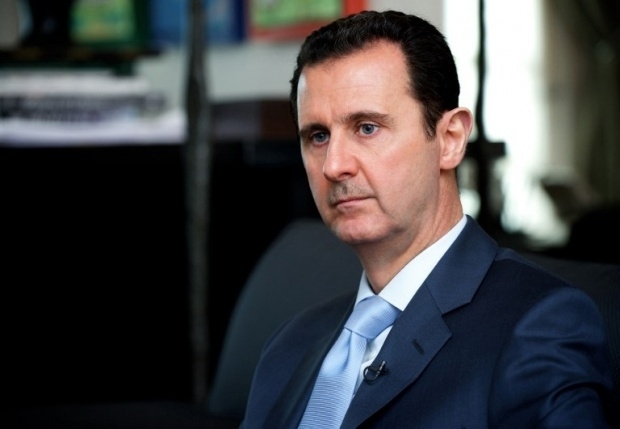
Syria's re-entry to the Arab fold took a notable step on Thursday after members of the Organization of Arab Petroleum Exporting Countries (OAPEC) unanimously announced that Damascus would host the Arab Energy Conference in 2024.
Oil ministers from OAPEC also agreed at the virtual meeting in Kuwait that Syria would chair the council of Arab energy producers for one year, starting in 2022, taking the place of the current chair, Saudi Arabia.
While Arab countries have recently been at the fore of engaging with Damascus, this has not always been the case.
Syria was expelled from the Arab League at the start of the country's Arab Spring uprising, and some Gulf powers, seeing the conflict as an opportunity to unseat the Assad family, backed opposition forces.
Now, with fighting having subsided and Assad in control of most of the country, Syria's neighbours are recalibrating, driven by concerns over Iranian and Turkish influence, and the economic and security repercussions of leaving the impoverished, war-ravaged state as a pariah along their borders.
New MEE newsletter: Jerusalem Dispatch
Sign up to get the latest insights and analysis on Israel-Palestine, alongside Turkey Unpacked and other MEE newsletters
Jordan's king held a much-publicised phone call with his counterpart in Damascus in October and has lobbied for sanctions relief in Washington so his fragile economy can resume trade with Syria.
The UAE is also reaching out. Earlier this summer the two country's resumed direct flights and Syria had a prominent booth at the 2020 Dubai Expo. Emirati businessmen have also visited Damascus to attend trade fairs.
A trip by the UAE's top diplomat to Syria in November was seen as a culmination of these efforts. Yet, while the two countries discussed potential investments in reconstruction , the UAE appears to be proceeding slowly.
The high-profile visit produced just one agreement for a group of undisclosed Emirati companies to back a solar energy plant in the Syrian countryside.
'Most formal test to date'
Analysts told Middle East Eye that the UAE's cautious approach makes the decision by OAPEC an even more noteworthy step in efforts to re-establish ties with Damascus.
"This is a big deal," said Howard Shatz, a senior economist at the RAND Corporation. "This is the most formal test we have seen to date of Syrian reintegration."
Few expect the decision will allow Damascus to transition from a war-torn country to an energy hub. The ability to sway oil markets rests largely with OPEC and OPEC+, where Saudi Arabia and Russia are the dominant players.
Syria's production capacity has always been small, and the little oil and gas deposits it does have are located in its Northeast, in territory controlled by US-backed Kurdish forces.
In addition, the country remains devastated by 10 years of conflict and is under the tight grip of the Assad family.
Jihad Yazigi, editor of The Syria Report, told MEE that "the Syrian economy is really destroyed", with corruption basically running through every aspect of life.
"The banks almost don't function, and don't offer significant loans, while the businessmen who could act as intermediaries with the regime… have left the country," he added.
But the unanimous decision by OAPEC members might mark the beginning of a shift, particularly as an indicator that Arab states who were more hesitant in their approach to Syria are now coming around.
Qatar is one example of a country that voted for the decision, even though its foreign minister publicly swore off normalising relations with Syria at a press conference with US Secretary of State Antony Blinken.
Shatz said OAPEC's decision was both political and economic. "It's the start of a formal process to normalise doing business with Syria," he said.
"If I'm a politically connected investor in the Gulf, my most important concern in Syria isn’t sanctions, it's can I do business in the country," he explained. "Will my investments be protected and contracts enforced?"
Oil ministers also appear to be offering a vote of confidence that the Syrian government will be around in three years' time to host the conference, when officials from some of the US's top regional allies are expected to descend on the capital.
Washington 'concerned'
Karam Shaar, a Syria expert and research director at the Operations and Policy Center, said the decision by OAPEC was a signal that the US's allies were running ahead of the Biden administration's approach to Syria.
"It's not the stated US policy, but the vibe you get from the administration is of allowing partners in the Arab world to toy with a more for more approach with Syria," he said.
"But what's happening on the ground is a lot more than toying," he added.
The White House has publicly stated that it has no intention of restoring ties with the Assad government.
A State Department spokesperson told MEE that the administration does not support its regional partners normalising relations with Damascus.
"The United States is concerned by reports of Syria taking a leadership role in OAPEC and subsequently hosting OAPEC in country," the spokesperson said when asked about Thursday's decision.
Both the Obama and Trump administrations sought to isolate Assad as a way to push for a political settlement in Syria. In 2020, the bipartisan US Caesar Act was passed authorising the US Treasury to impose sanctions on virtually anyone doing business with the country.
While the White House has kept sanctions on Syria in place, one subtle shift has been its commitment to focus more on humanitarian issues.
Along those lines, the administration eased restrictions last month on non-governmental organisations to interact with Syria's government and broadened the types of activities they could carry out in the country.
Even before that, the US's Arab allies - who are concerned by Washington's commitment to their security in the face of threats from Iran - were eagerly stepping into the breach offered by humanitarian work.
For Jordan and Egypt, it was a US-backed plan to supply energy to Lebanon via a pipeline going through Syria. The UAE's claim that it would build a solar power plant in Syria also gave a node to humanitarian issues, straddling the line of early recovery work.
IRGC commander removed
One former State Department official told MEE while the Biden Administration had not departed from the Syria policy of its predecessors, there may be a small change in how Washington understood the approach of its partners.
"There is a realisation in the administration that even if we are definitely not ready to work with Assad, we can't force other countries not to."
According to one source in the US Senate staff, who asked to remain anonymous, whether the administration acknowledges it publicly or not, the US was losing out by only interacting with opposition forces given the reality of Assad's staying power.
"From a diplomatic perspective, we are blind to what is going on in regime-held areas, and the internal dynamics in the regime," the source said. "Having allies that could act as intermediaries and inform us would be valuable."
But the decision by OAPEC will likely test the White House's tolerance for its partners to engage with the Assad government. The recent announcement, unlike others, is hard to couch in anything other than political grounds.
Several analysts are also sceptical that Arab states will be able to show results.
"Arab countries are extending an olive branch to the Assad regime without it making any concessions," Shaar told MEE. "It seems like Bashar al-Assad has managed to lower the expectations of everyone."
On what is likely the greatest security challenge, the presence of Iranian troops and proxies in Syria, it’s unclear if Washington’s partners are making any progress.
According to reports by Saudi media in November, Assad dismissed the commander of Iran's Islamic Revolutionary Guard Corps (IRGC) in Syria. The move was heralded as "part of the negative trend facing the Iranian position in Syria".
But for some, the timing of the commander's removal was too perfect.
"Announcing that the Syrian government expelled him [the commander] is a great story that the regime can give Gulf states to make them feel like they are progressing," Natasha Hall, a senior fellow at the Center for Strategic and International Studies, told MEE.
"The Syrian regime historically excels at playing different players off of one another," she added, "[and this] could create a narrative that makes the Gulf feel like they are making progress."
Middle East Eye delivers independent and unrivalled coverage and analysis of the Middle East, North Africa and beyond. To learn more about republishing this content and the associated fees, please fill out this form. More about MEE can be found here.


